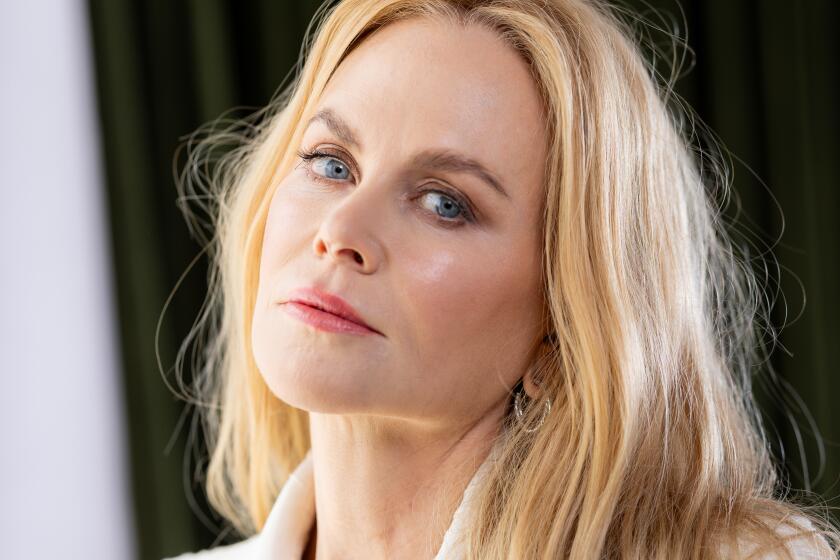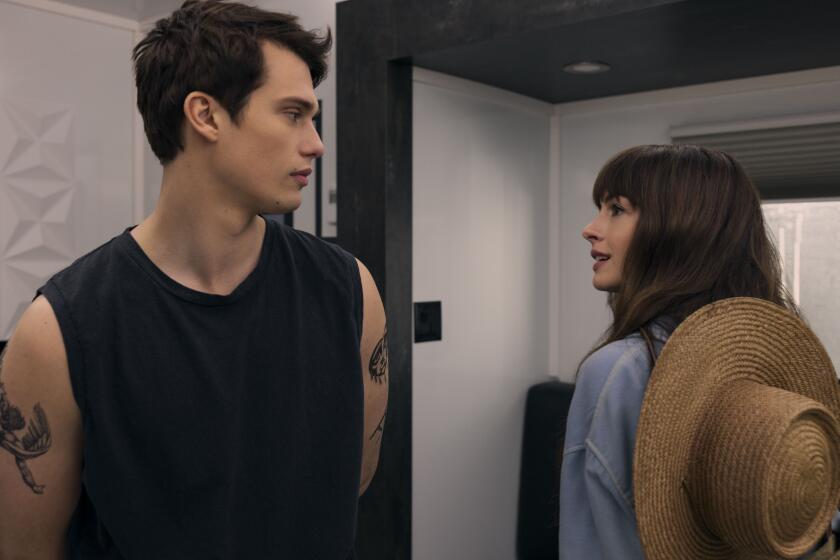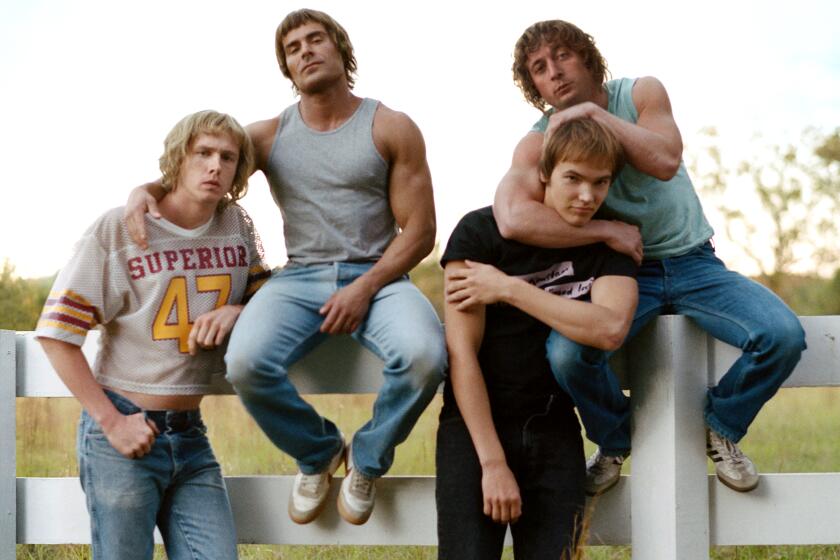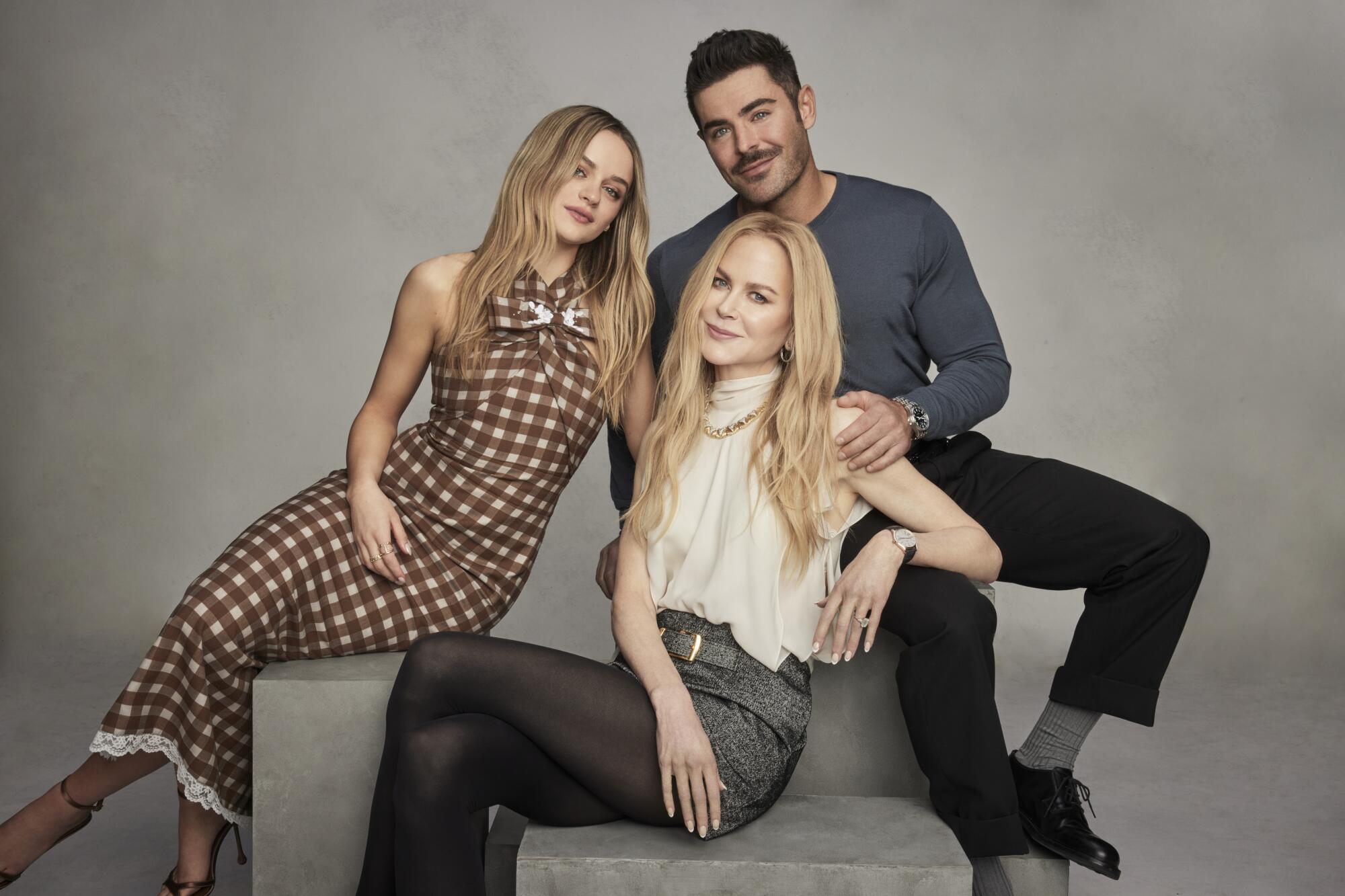
Nicole Kidman was yearning to make a romantic comedy.
The Oscar winner wanted to shift course after playing a tragically depressed housewife in the miniseries “Expats” on Prime Video. She wanted to have a good time. She wanted Hollywood, for once, to send a rom-com script her way.
When she received the screenplay for “A Family Affair,” Kidman leapt at the opportunity to shed her dramatic persona and take on lighter material. In the Netflix film, premiering Friday, she channels Brooke Harwood, a widowed mom and award-winning memoirist with writer’s block. Brooke’s 24-year-old daughter, Zara (Joey King), still lives at home while working her thankless day job as an overworked personal assistant to Chris Cole (Zac Efron), a vain and insecure movie star who threatens to fire her over the slightest mistakes.
One afternoon, Brooke unexpectedly encounters Chris, who’s 16 years her junior, and the physical attraction is instantaneous. It eventually blooms into real love, angering Zara; she worries that Chris will break Brooke’s heart just as he has with past exes. But Brooke is not just any woman. She’s got wisdom that comes with age, and Chris’ global fame as the star of a superhero franchise means nothing to her. Instead, she sees the playful, loving man within him. And he truly values her, body and soul, and gives her something to write about again. (Is it getting hot in here?)
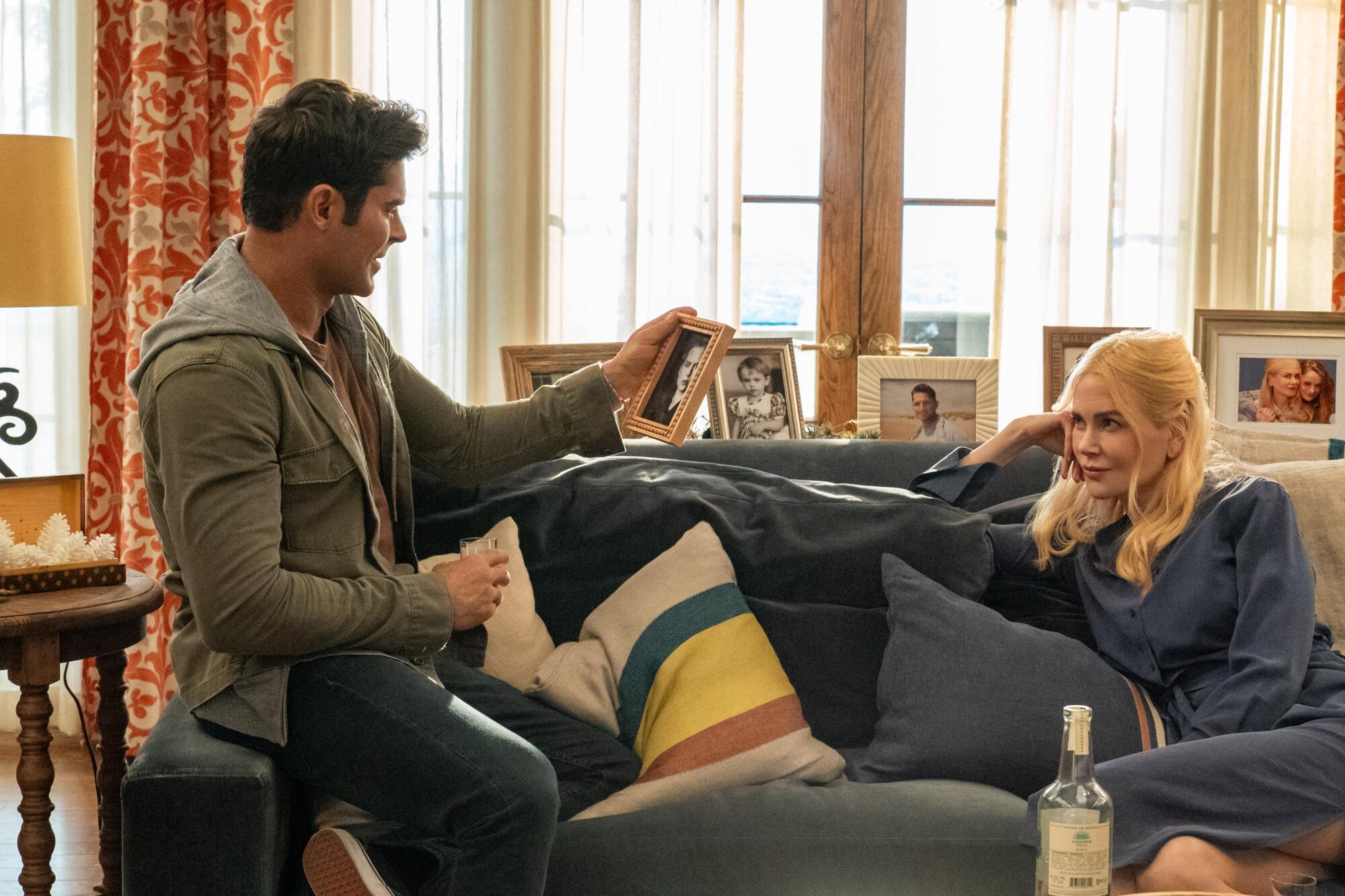
Kidman, 57, and Efron, 36, previously played lovers in 2012’s “The Paperboy,” a gritty melodrama that has an extremely different ending. They were eager to reunite, this time in a joke-filled romance where the stakes are less life-and-death and more existential. The age-old question — What am I doing with my life? — reverberates throughout the film.
The Times recently spoke with Kidman, Efron and King to discuss the joys and taboos of filming a rom-com that pairs an older woman and younger man — a dynamic that continues to stoke public interest, and sometimes contempt. Kidman, as usual, was up for the challenge, and Efron found that irresistible. This conversation has been condensed and edited for clarity.
I watch a lot of romantic comedies, and this one stands out as a happy marriage of casting and writing. How did Carrie Solomon’s screenplay get into your hands?
Kidman: It was just one of those things where it was sent to me and I read it and I went, “Yeah, I have to do something that is fun and funny and completely different.” Because I’d been through “Expats” — you know, the trajectory of my career has always led me more towards drama. I was like, “Please, I’m begging to have some fun and to be considered for some sort of romantic comedy at some point.” So, this came to me, and I was like, “Yes, please, please, please.” Because I never get offered them. I never get considered.
How did the actor-producer persuade the writer-director to come on board? “What I tried to say is, ‘What the hell? Let’s just go for it,’” Kidman says.
Efron: I think there was something specific about the characters that I felt there was a natural inroad to them. I could understand Chris on some levels and what he was going through, and that was just exciting to think about playing that for me. Then, of course, at that point Nicole was involved — and I dream of working with Nicole — and Joey was also in talks for It. That was just a dream scenario for a rom-com.
Kidman: Joey is so funny. It was that kind of thing [where] you’re going, “OK, great. There’s this young girl who can come in and just nail it.”
Efron: Initially the script was called — can I say that?
King: Yeah, say it. We’re [with] the L.A. Times.
Kidman: It had a different title.
Efron: It had a different title, which made it really exciting to read. It was called “Motherf—.” As soon as you get that script — when it says that on the front — you can’t help but want to read it.
Nicole and Joey, yours is not a typical mother-daughter story. At times, the roles reverse, and Zara occupies the position of overprotective parent — in this case wanting to keep Brooke away from Chris. How did it feel to channel that?
King: One of the most truthful and realistic parts about this, which I really love, is that particular moment when a child, no matter how old they are, realizes that their parent is a person, not just their parent. [Zara] needs to learn to grow up a bit, and Brooke’s trying to teach her and help her make her own decisions. Zara wants to be an adult but [is] still stuck in this child role. I think they both really see each other for the first time in terms of, “You’re not just my parent. You’re a real woman who has womanly desires and I need to grow up. I’m not just a kid.” That transition is really, deeply uncomfortable for them and they have a lot of tension and they’re fighting, and Chris is caught in the middle of that tension.
Kidman: There’s an enormous amount of love, too. They like hanging out together. … We watch TV together, we eat together, we watch shows together. There’s that sort of gap that I have that I’ve now filled with her, so at some point I have to let her go.
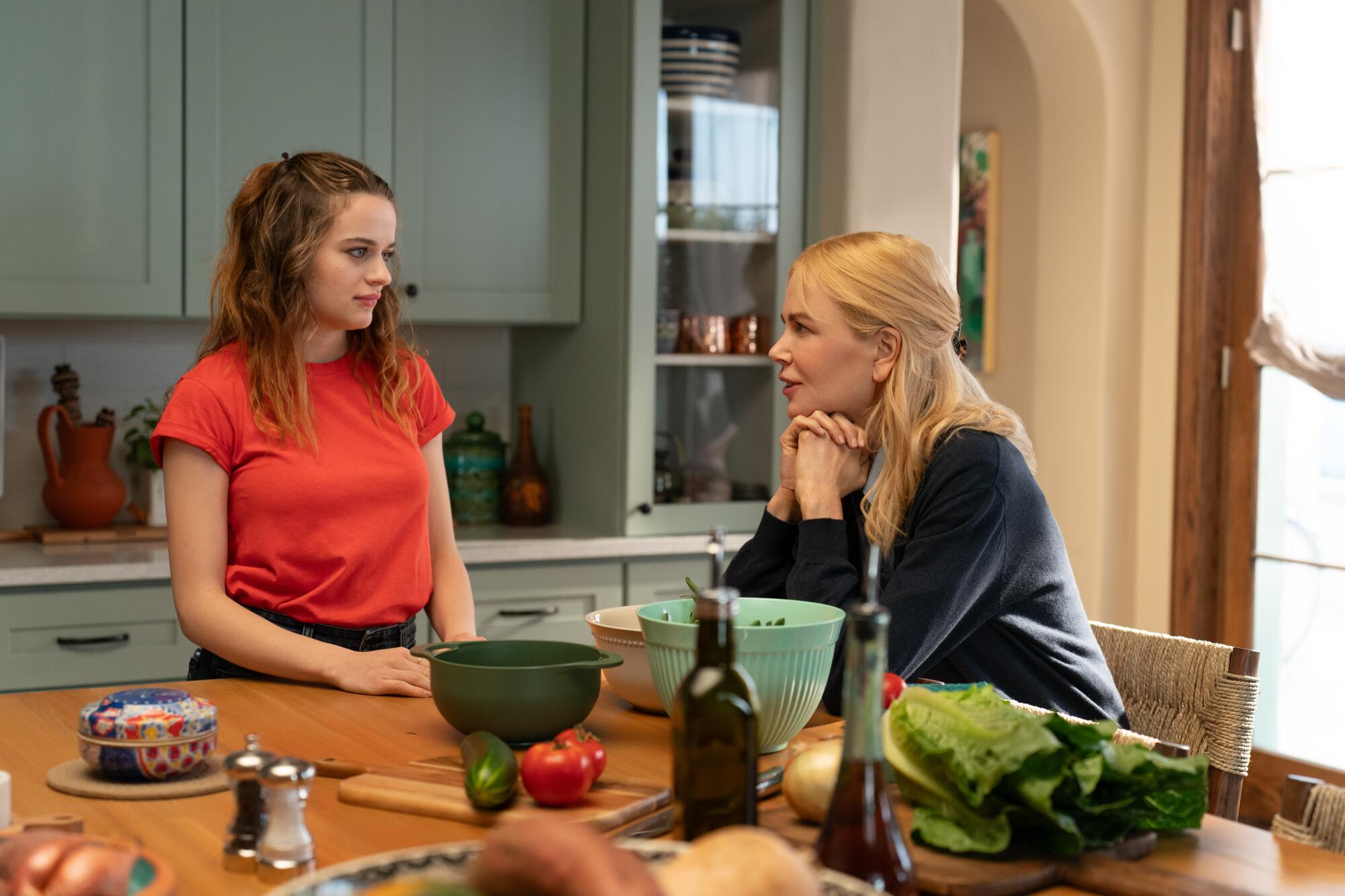
Zac, you pull a Tom Hanks in “You’ve Got Mail.” You take a guy with villain qualities and make him worth rooting for. How did you connect with Chris?
Efron: I can relate to Chris in a number of ways, but it was fun to … dive into different emotions and things that [make me] feel for him. He’s struggling. He’s not handling it the best. … I think he’s honestly trying his best and it’s just hard. He’s taking it out probably in a way he doesn’t mean to be, but it’s very abrasive toward his assistant. [Then] he meets Brooke, who he doesn’t have to really pretend to be anything but himself around.
Nicole and Zac, you both starred in “The Paperboy.” Zac’s character was hopelessly in love with Nicole’s, who in turn was hopelessly in love with a convicted felon (John Cusack). How was it reuniting 12 years later — for a rom-com?
Efron: The tone of [“The Paperboy”] is very different, but I think the building blocks of our characters were there for [“A Family Affair”], and that was kind of an unrequited love. We didn’t really get to take it the whole way and this really felt like we could draw a lot from that experience and take it to a whole new level. And it was easy. It felt really natural.
Kidman: We’re very easy with each other. I mean, part of the thing was going, ”If you’re doing this, I’ll do it [with you].” We wanted to do it together. I know how funny he is and he’s also just brave. Actually, with the comedy and stuff, he was like, “OK, let’s try this. We’ll try that.” It was just “anything goes.” … I just wanted to be able to be with a group of people who weren’t going to take everything so seriously. That allowed us [to] just play. Because a lot of it is play.
A new rom-com starring Anne Hathaway on Amazon Prime Video has a divorced mom and a Harry Styles-esque pop star meet at Coachella. Could it happen in real life?
The scene when Zara discovers Chris and Brooke in bed, then hits her head in horror, is a brilliant bit of physical comedy. How many takes did that require?
Kidman [motioning toward King]: The perfectionist here kept asking to do it again and again and again.
King: When I’m doing anything that has any kind of stunt work in it, I like to watch [the] playback to see if I’m selling it enough. The head bump looked fake for the first three or four takes, so I probably did six or seven or eight.
Kidman: More than that. Maybe 20, 15? She’s like, “I’ll do it again!” We’re like, “Don’t hurt yourself.”
King: The two of them were so funny and supportive. They were getting such a kick out of it. They were off camera and they stayed to watch me.
Efron: It was so entertaining, we had to stay. Like, you were doing it 100%. There were no sound effects for you hitting your head. … It was some serious Jim Carrey vibes.
Kidman: Lucille Ball.
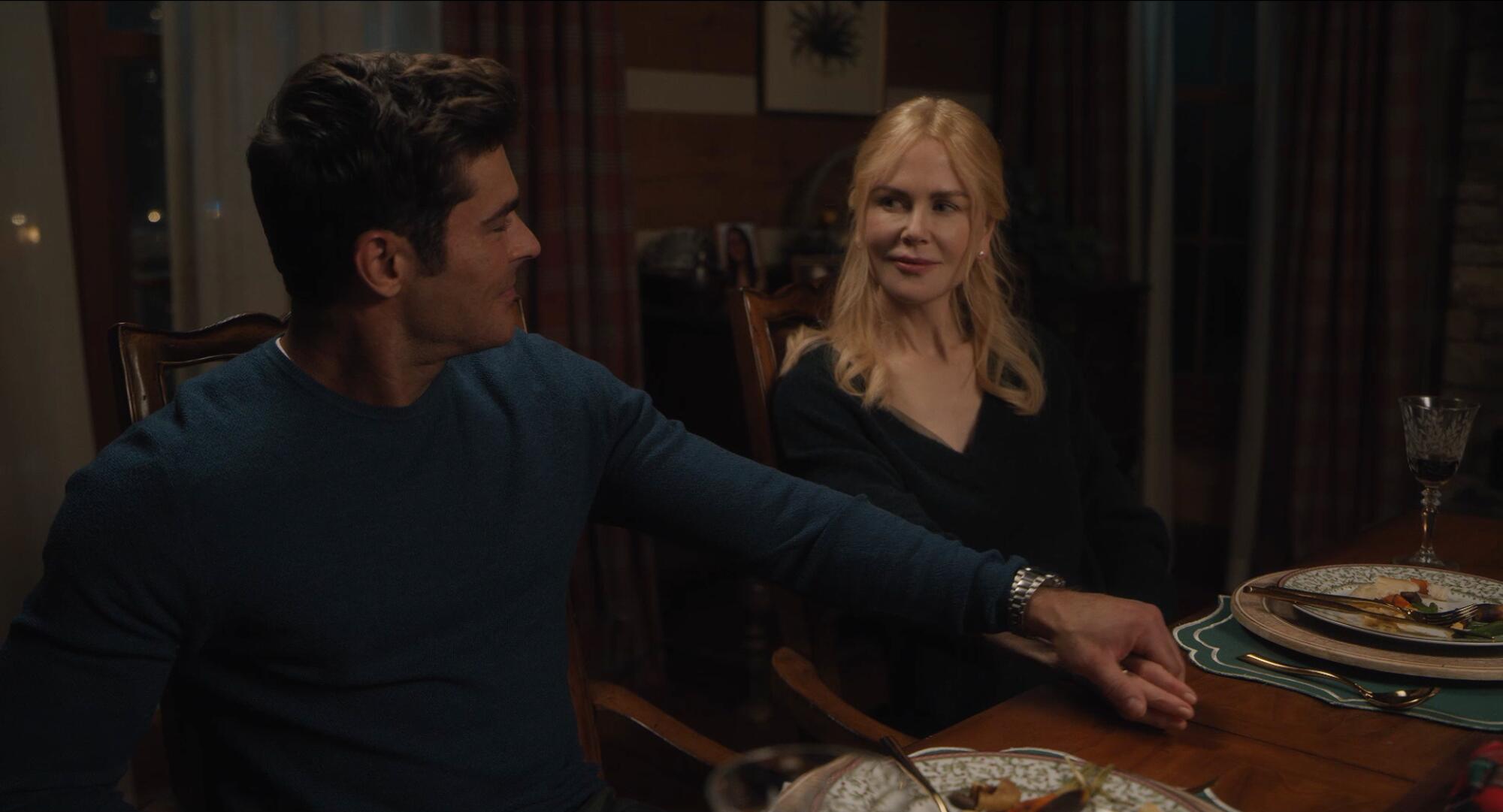
Like “The Idea of You,” “A Family Affair” is a lighthearted romance pairing an older woman and a younger man, a trope that society still treats with suspicion. Why are stories like this important to tell?
Kidman: I mean, I can only say I’m glad the whole landscape is changing, and it shouldn’t be an anomaly. … We’ve had an abundance of older men and younger women, but we haven’t had the abundance of older women with younger men. And why not? … [“A Family Affair”] was written by [Solomon], who went in and [said], “This is what I want to tell. This is the story I want to tell.” Now we’re going to start to see the effects of the work that has been done for the last five, 10 years where we’re still trying to change the storytelling landscape and put women in places of power so they can tell these stories — whether they be comedies, whether they be dramas, whether they be thrillers, whatever they are. We just haven’t had the equivalent that we’ve had with the male gaze.
Efron: We want more of it. We need more of it.
Kidman: And we’re lucky to have guys like Zac who will go, “Yeah, I’m up for it. Let’s go.”
Efron: Yeah, it works out great for me. I’m like —
King: “Yes!”
Filmmakers have told me that they have a hard time persuading actors to star in romantic comedies. Why is that often the case?
King: I think maybe some people don’t do [them] because they’re afraid of not being taken seriously as a serious actor. … People who are able to [act in] very different genres, I think it’s actually the biggest flex that you can have in terms of showing the range that you have. Look at Zac. He was training for “Iron Claw” while making “A Family Affair.” … What a flex.
Efron: It’s important. You really want to, I think, be able to at least try everything.
King: Comedy’s fun! Comedy’s fun and comedy’s hard. Comedy’s really hard.
Filmmaker Sean Durkin on why he cut Chris Von Erich out of A24’s new wrestling tragedy, and what’s fact versus fiction in the dramatization of a sports dynasty.
Can comedy be harder than drama?
King: It can be.
Kidman: It depends who’s at the helm. It depends on the chemistry.
Efron: If you can bring it to a place where it’s real, it kind of feels oddly similar to a drama.
Kidman: They always say it’s such a fine [line], especially when you’re doing a drama, you can move very, very quickly into satire or comedy. … In that sense, it’s almost like with drama: You’ve got to go, “No, no, stay here in the present moment.” Because if we start to ridicule it, it can move into that place very quickly and then it’s hard to move back.
King: It’s hard, and it’s easier when you have a creative team that’s supportive and the actors you’re working with are super-nonjudgmental. We’re all sitting there while each of us takes these crazy swings in terms of improv and risky swings. Some of them don’t work, but I don’t feel embarrassed. … It’s still a difficult thing to get right sometimes, but you don’t feel like there’s any limitations on what you can do when you’ve got really great people to work with.
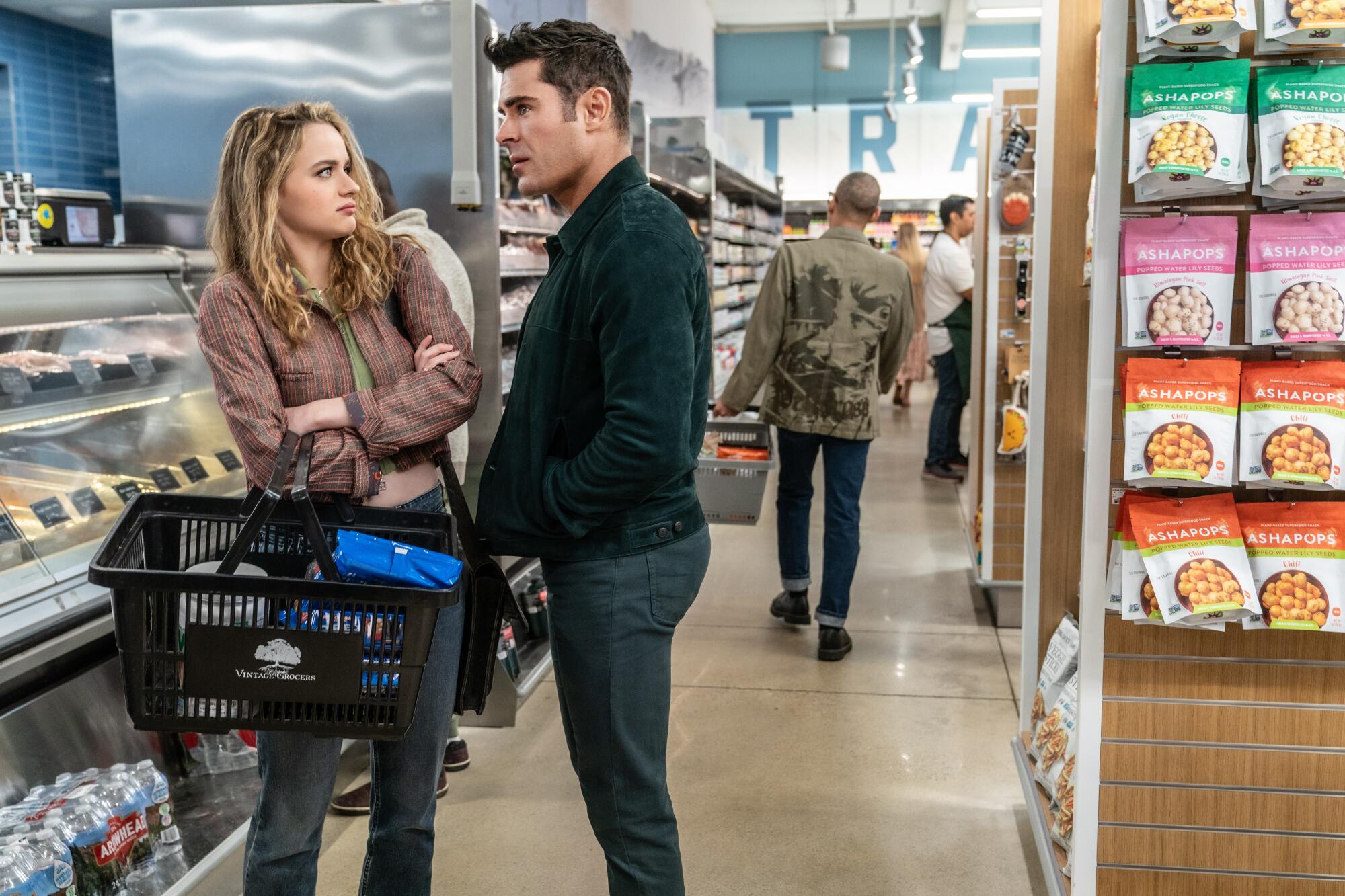
In the film, it’s revealed that Chris has not shopped at a grocery store since becoming mega-famous. Can any of you relate?
King: No, I can’t. I go to the grocery store all the time.
Kidman: I have teenage girls. We go to the grocery store because everybody wants something different.
King [to Kidman]: Do you find it hard to go to the grocery store, though? Just because everyone knows who you are?
Kidman: No. I put a cap on … and I hold my head high, and we go in there.
King: I love the grocery store.
Kidman: I have to say it’s kind of fun and relaxing.
King: Some people find the grocery store very anxiety-inducing, but I actually find it really lovely. I think it’s so fun, especially because usually I’m going to make something that I’m excited to make.
Chris asks Zara to buy him strawberry-flavored Oreos. Zac, what’s your go-to snack?
Kidman [to Efron]: You’re a great snacker because [you’re] very healthy.
Efron: I’ve been eating super-clean lately.
King: I got him these protein Pop-Tarts as part of his wrap gift.
Efron: It was the sweetest thing I’d had in months and it was so good. … I think I had them all in one sitting.
More to Read
The complete guide to home viewing
Get Screen Gab for everything about the TV shows and streaming movies everyone’s talking about.
You may occasionally receive promotional content from the Los Angeles Times.
